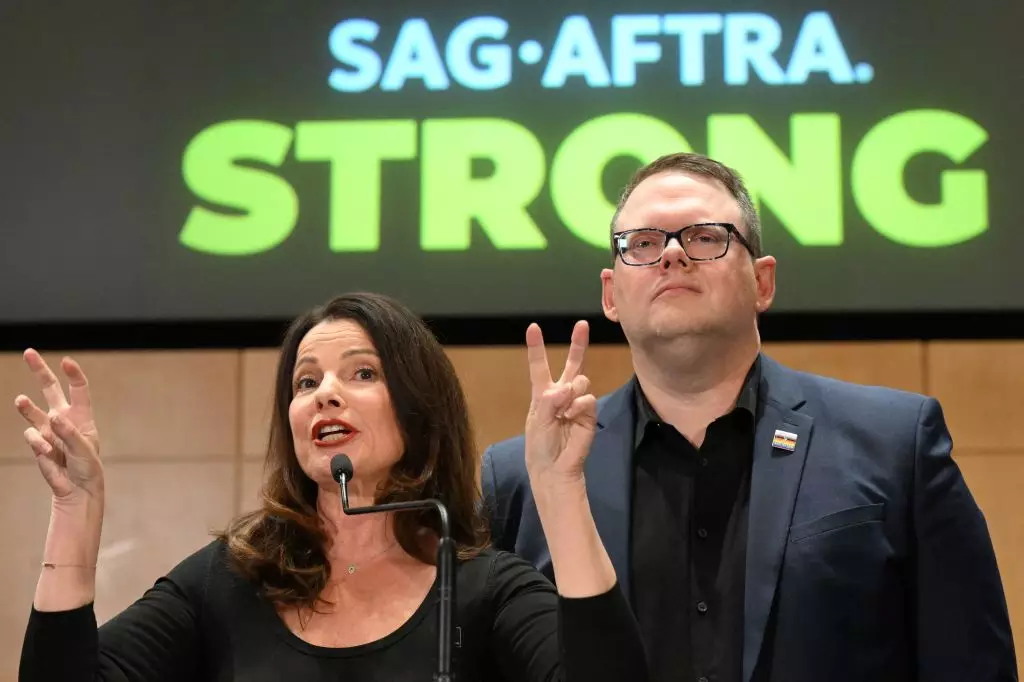SAG-AFTRA President Fran Drescher and National Executive Director Duncan Crabtree-Ireland recently spoke at a press conference to discuss the resolution of the actors’ 118-day strike and the details of the deal with the AMPTP. During the conference, they provided insights into the stressful moments and the critical turning point during the negotiations. They also shed light on the unexpected reversal from the studios regarding AI and streaming revenue. Drescher expressed pride in the achievements made in the new contract and commended the negotiating committee and the members for their resilience. However, it was evident that not all members of SAG-AFTRA’s national board were satisfied with the deal, as the level of support was lower than expected at 86%. The voting system, which attributes different weights to each vote, made it challenging to determine the exact number of dissenting votes. Full details of the contract will be disclosed by Monday, and the voting process will commence on Tuesday.
A Shift in Perception: Recognizing the Disparity in Streaming
At the beginning of the press conference, Fran Drescher acknowledged the existing disconnect when it came to streaming platforms. She realized that the current contract would not significantly improve the lives of actors working in this arena. The entire structure of the contract needed to change to address this issue. Drescher stated that she and the committee recognized the importance of exploring alternative revenue streams. However, every attempt to introduce this topic was met with resistance from the AMPTP. Duncan Crabtree-Ireland confirmed that their initial ask was not gaining any traction. The studios were confronted with a new leadership that would not yield to their intimidation tactics. Drescher and Crabtree-Ireland persisted in advocating for a revenue share model and proposed different options, including a 1% or a 57 cents per subscriber, per year approach. Eventually, the studios had to acknowledge the demands for respect and initiate discussions on finding a resolution.
Fran Drescher emphasized the studios’ responsibility to rise to the occasion and meet the demands presented by SAG-AFTRA. The leadership at the studios began working together to develop a modality that would cater to the various AMPTP members already involved in streaming or considering it. They presented a model to the Writers Guild of America, which was accepted but did not fully address SAG-AFTRA’s objectives. Despite the disparity, Drescher acknowledged the need to find common ground and make it work. She emphasized the importance of being flexible and not letting the perfect become the enemy of the good. It was at this critical juncture that Duncan Crabtree-Ireland proposed the idea of a streaming bonus fund. This fund would enable the union to distribute money to actors using the existing studio mechanism. The fund operates on a 75/25 split, with 75% of the money going to actors on qualifying shows. Drescher mentioned that these shows, which she referred to as a “thimble worth of shows,” deserved to receive the bonus. She also highlighted the significance of opening a new revenue stream, even if the mechanism and amount were not ideal. Looking to the future, Drescher suggested that the criteria for bonus payments could be adjusted in the next contract, potentially lowering it from 20% of viewers to 10%.
Fran Drescher underscored the evolving nature of the entertainment industry and the need for continuous adaptation. She expressed her realization that the current negotiation represented a starting point rather than a conclusion. The contract must be considered a living document that can be further refined. Drescher proposed that the industry should embrace the ongoing changes, adapt criteria, and continue finding innovative solutions to meet the demands of the evolving entertainment landscape. She exhibited optimism and determination, encapsulating her philosophy with her “Fran Plan” that revolves around time and patience. Although the negotiation process was undoubtedly stressful, Drescher expressed her gratitude to the AMPTP for recognizing the significance of this historic negotiation and rising to the occasion.
Fran Drescher and Duncan Crabtree-Ireland shed light on the arduous journey to reaching a resolution and the importance of advocating for actors in the changing entertainment landscape. The deal with the AMPTP represents a significant step forward in addressing the disparities and challenges faced by actors working on streaming platforms. While the negotiation process was not without its hurdles, the union leaders displayed resilience and the willingness to explore unique solutions. As the contract details are shared and the voting process begins, the industry eagerly awaits the implementation of this new agreement, while recognizing the ongoing evolution of the entertainment industry.

